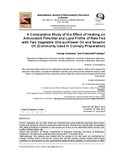A comparative study of the effect of heating on antioxidant potential and lipid profile of rats fed with two vegetable oils-sunflower oil and sesame oil (commonly used in culinary preparation)

View/
Date
2015-06-04Author
Saramma, George
Padmaja, Chaturvedi
Publisher
SCIENCEDOMAIN internationalRights
Available under creative commons licenseRights holder
Saramma and PadmajaType
Published ArticleMetadata
Show full item recordAbstract
Aims: Vegetable oils are fats, which are extracted from plant materials especially from seeds,
which may change its chemical composition when heated. Therefore the present study investigated
the effect of heating of sunflower oil and sesame oil on the in-vivo antioxidant status and the lipid
profile in Wistar albino rats.
Place and Duration of Study: Department of Biological Sciences, University of Botswana,
Botswana. The study was conducted from January 2012 - December 2012.
Methodology: The animals were divided into five groups of six rats each and maintained as
follows: Normal control received the normal diet and two positive controls treated with heated
sunflower oil and sesame oil, two experimental groups-treated sunflower oil and sesame oil after trying the potato chips. At the end of the experimental period of 60 days the rats were sacrified and the blood was collected for biochemical estimations. The weights of the animals were recorded every week.
Results: The results indicated that sesame oil is much better in keeping the antioxidant status and cause lesser lipid peroxidation as well as hepatotoxicity when compared to sunflower oil. Again the cardioprotective effect of sesame oil is higher than that of the sunflower oil.
Conclusion: So in conclusion, sesame oil showed a higher level of protective effect than that of sunflower oil and is a better choice for culinary purposes.
